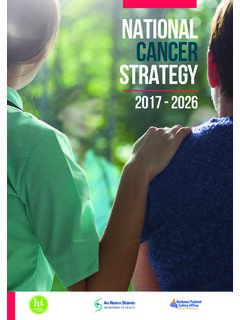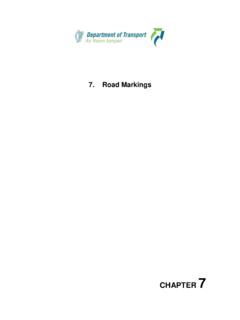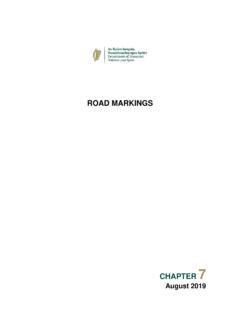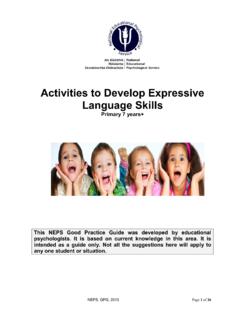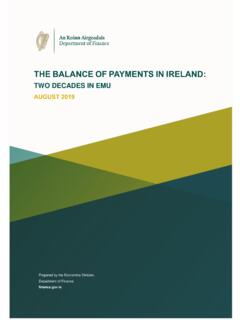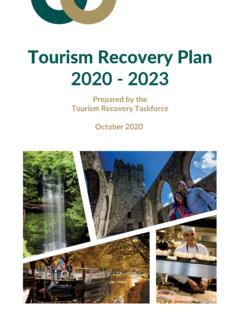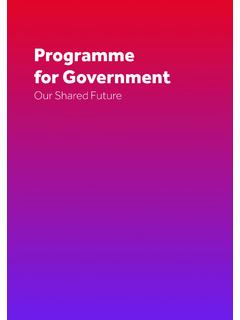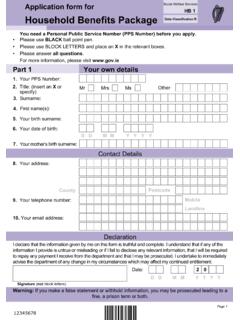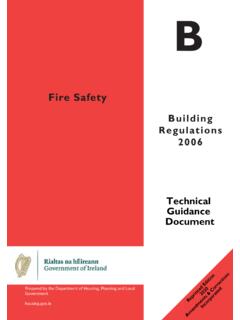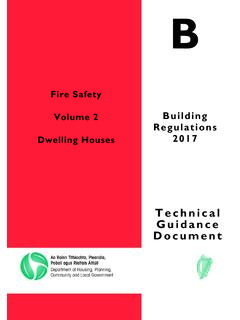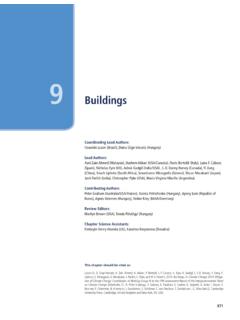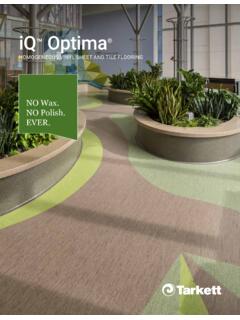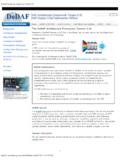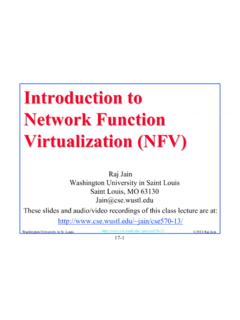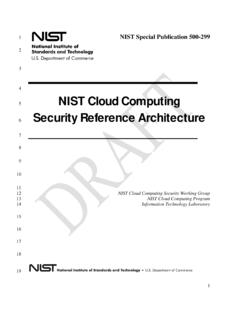Transcription of Sample Project Charter
1 Project Woodland Project Charter Release : Date Page: 1. of 30. DOCUMENT CONTROL. DOCUMENT INFORMATION. Information Document Id Project Charter Document Owner Project Board Issue Date TBD. File Name Project Author Project Manager DOCUMENT HISTORY. Version Issue Date Changes Initial discussion draft: Sponsor, Board, WG Chairs, DAFM Leads Draft with amendments from Project Board and DAFM. Board approved this version for release Page 2 of 30. Contents 4. Project WOODLAND BACKGROUND & 4. BACKGROUND .. 4. DELIMITING Project SCOPE .. 6. FORESTRY POLICY GROUP (FPG) .. 6. Project OPERATING DEFINITION AND ASSUMPTIONS .. 8. ARRANGEMENT OF THE WORK .. 10. WORKGROUP TERMS OF REFERENCE, SCOPE, 10. BUSINESS SYSTEMS ANALYSIS & PROCESS .. 13. INDEPENDENT REVIEWS IRELAND, EU AND EUROPE .. 13. Project COMMUNICATIONS AND REPORTING.
2 14. GOVERNANCE .. 15. ROLE OF THE Project 15. ORGANISATION OF WORKGROUPS .. 15. ROLE OF THE SPONSOR AND Project MANAGER .. 15. GOVERNANCE Project ORGANISATION .. 15. GOVERNANCE Project BOARD STANDARD OPERATING PROCEDURES .. 17. GOVERNANCE WORKING GROUP STANDARD OPERATING PROCEDURES .. 21. CHANGE CONTROL PROCESS .. 24. APPENDICES .. 25. 1. OVERALL STATUS REPORT .. 25. 2. WORKGROUP STATUS REPORT .. 29. Page 3 of 30. INTRODUCTION. In standard Project management practice, a Project Charter would be drawn up at the start of the process, however, given the pace and urgency of the work needed on Project Woodland, substantial work has already been undertaken. This Charter has been prepared to draw those threads together into a single document as well as design a process for future delivery. It draws on documentation generated since the decision to proceed with the Project including: the O'Hara Report1, the MacKinnon Report2, workgroup meeting agendas/minutes/notes) and Project Board decisions.
3 To that purpose it looks back to mid- March 2021 to document the common understanding of the nature, purpose, organisation and resourcing of Project Woodland. A Project Charter sets out core operating principles together with a procedural framework in line with the general requirements of professional Project practice. It provides a consistent basis for: Project management/oversight delivering and responding to evidenced submissions and recommendations setting clear expectations managing risk tracking overall progress assuring quality, successful governance and delivery. Project WOODLAND BACKGROUND & SCOPE. BACKGROUND. Project Woodland (PW) comprises four closely linked workstreams that have been initiated by DAFM following: (1) a review of forestry licensing and associated processes during November 2019 by Jim MacKinnon, and (2) subsequent 2021 analysis and recommendations by Jo O'Hara for implementing MacKinnon.
4 Following the MacKinnon review, and throughout the first half of 2020, there was a significant increase in appeals against licencing decisions. Resultant delays in processing felling licences threatened the timber supply chain and the rate of growth of the backlog increased as a consequence. The workstreams were established formally as four Workgroups (WG) during Q1 2021, each WG dealing with a workstream designed by O'Hara to implement MacKinnon. The four Workgroups (referred to here as WG1, WG2, WG3 and WG4) address the depth and breadth of the MacKinnon recommendations: (1) WG1 deals with the licencing backlogs, (2) WG2 is formulating future strategy and a national approach to forestry, (3) WG3 is reviewing DAFM forestry organisational development and customer-centric focus, and (4). WG43 seeks to improve end-to-end licensing processes.
5 1. O'Hara, Jo (2021), Implementation of the Mackinnon Report: Advice to the Minister of State for Land Use and Biodiversity on improving the delivery of forestry licensing processes', FutureArk Ltd 2. MacKinnon, Jim (2019), Review of Approval Processes for Afforestation in Ireland'. 3. WG4 has an important sub-task of understanding licensing processes in other European countries, the legislative/regulatory frameworks for Forestry in Ireland and the role of the EU now and in the future in influencing such processes. Page 4 of 30. The overall Project Board is chaired by the Secretary General of DAFM. Each workgroup has an external Workgroup Chair, key voluntary representatives of the wide Forestry/Environment sector, a DAFM lead, DAFM secretariat services and other support/advisory personnel from DAFM. The organisation structure of PW is detailed later in this document.
6 The licence backlog increased year on year to 2021. There are significant challenges to effectiveness and efficiency of the licensing ecosystem that may require process re- engineering. Following the change in administration in 2020, legislative changes to the appeals process were introduced, there was a substantial increase in specialist resources and the Forestry Appeals Committee was strengthened. However, O'Hara's report raises significant concerns as to pace and progress on other MacKinnon recommendations, while recognising the potentially complex legal issues, arising from Irish case law and domestic/European legislation and the impact on the work of DAFM as both policy setter and industry regulator. A particularly clear recommendation from O'Hara was for improved and persistent sector communications and open discussion of the reality of extant legal constraints to help stakeholders to engage with the processes more effectively.
7 DAFM has initiated Project Woodland, moved to address perceived weaknesses in Project management and communications, and established a clear pathway to deliver all recommendations. Project Woodland now has clear scope, accountability and governance, objectives, deliverables, progress monitoring and reporting as covered in this Charter . Page 5 of 30. DELIMITING Project SCOPE. IN-SCOPE. Project Woodland in-scope work is defined by the O'Hara/MacKinnon recommendations as shown in Table 2 which also allocates the work across four workstreams and indi- cates their importance (1=Highest priority). These workstreams are important for organising the work and engaging meaningfully with others. They should be used as a basis for building coalitions of key actors (not just DAFM. staff) so that the process of forestry approvals can re-gain good levels of trust and ac- ceptance.
8 This need for collaborative working cannot be over-emphasised: the current sit- uation cannot be addressed without constructive action from many stakeholders. Table 2. Scope of work4. Initial deliverables and milestones were suggested for each workstream which have been collaboratively refined by the groups. The Project Board will need to sign-off the firm deliverables and the timing of milestones based on resource availability (in DAFM and elsewhere). OUT OF SCOPE. Several items/issues are noted in Annex 4 to the O'Hara report and deemed out of scope for Project Woodland. FORESTRY POLICY GROUP (FPG). The establishment of a Forestry Policy Group (FPG) addressed some previous limitations in cross-sectoral dialogue; Project Woodland's work will set out a national vision and 4. Taken directly from the O'Hara Report.
9 Recs 17 and 18 were moved to WG3 from WG2 following discussion with the Project Board Page 6 of 30. strategy that will help to increase trust with stakeholders and set the groundwork for the 2023 EU Forest Policy. The FPG is comprised of representatives from industry, environmental NGOs, community, farmers, and state agencies. Current members are: Organisation Nominee NPWS Jenni Roche EPA Bernard Hyde Teagasc Nuala Ni Fhlatharta Forest Industries Ireland (FII) Mark McAuley FII Brian Murphy FII Peter O'Brien FII Marina Conway Association of Farm and Forestry Contractors in Ireland Michael Moroney IFA Vincent Nally Coillte Mark Carlin Association of Irish Forestry Consultants Dermot Houlihan Agricultural Consultants Association Andy Dunne Irish Timber Growers Association Donal Whelan Pro Silva Paddy Purser None So Hardy Nurseries Teige Ryan Environmental Pillar Andrew St Ledger An Taisce Elaine McGoff SWAN Mark Boyden Irish Wildlife Trust P draic Fogarty Birdwatch Ireland Oonagh Duggan Woodlands of Ireland Joe Gowran Irish Rural Link Seamus Boland COFORD Eugene Hendrick Irish Forestry Owners Nicholas Sweetman Forest Owners Co-operative Society/Limerick/Tipperary Woodland Owners Kathryn O'Donoghue Stop Climate Chaos Coalition Sadhbh O'Neill The FPG provides a
10 Forum for sector stakeholders to input on the achievement of commitments in the programme for government and to address the range of immediate challenges currently facing forestry in Ireland. This forum facilitates those stakeholders, state agencies, industry, community groups, farm bodies and NGOs working together and with DAFM to propose improvements to the current operation of forestry policy and input into the development of a new national forestry strategy. FPG inputs are key to the work of Project Woodland as it moves forward with a vision and strategy for forestry in Ireland for 2022 and beyond. The FPG has opportunities to interact across the Project Woodland workgroups including licensing process improvements, elimination of system backlogs, organisational improvements and a customer-centric focus.
